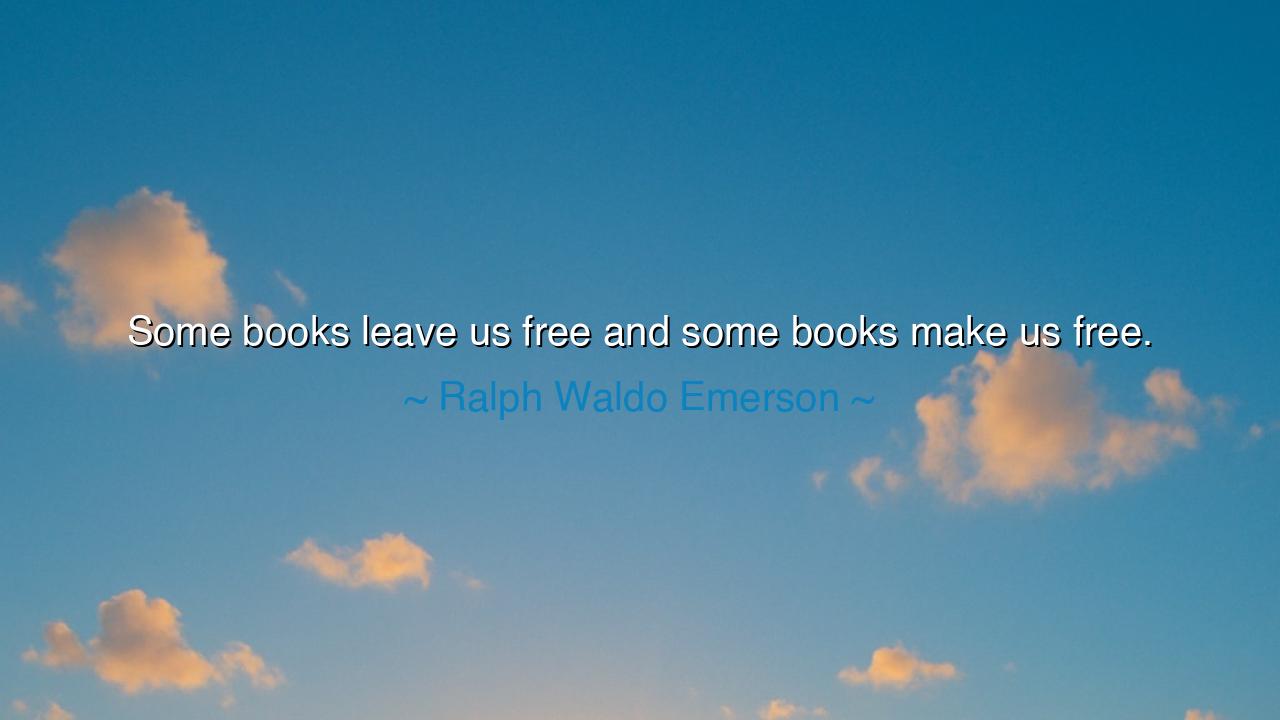
Some books leave us free and some books make us free.






“Some books leave us free and some books make us free.” — Thus declared Ralph Waldo Emerson, the philosopher of the soul’s liberty, the poet of self-reliance, and the seer who taught men to think for themselves. In these few words, Emerson unveils a truth as sharp as a blade and as luminous as dawn: not all books awaken the spirit; some merely entertain the mind, while others ignite the fire of freedom within us. The written word, he reminds us, has a dual nature — it can lull or it can awaken, enslave or liberate. The difference lies not in the beauty of its phrasing, but in the power of its truth and the courage it stirs in those who read it.
To be left free by a book is to be entertained or informed, to taste its wisdom and move on unchanged. Such works may delight the senses or feed the intellect, but they do not reach the depths of the soul. They leave us as we were, unbound and unburdened, but also untouched. Yet to be made free — ah, that is another thing entirely. The book that makes us free does not merely speak to us; it awakens us. It breaks the chains of ignorance, fear, and conformity. It dares us to think, to question, to see the world anew. Such a book becomes a mirror to the spirit, showing us who we are and who we might become. Emerson, the champion of individual thought, understood this deeply — that true learning is not accumulation, but liberation.
This idea flows from Emerson’s own life and philosophy, born of the great currents of the Transcendentalist movement in nineteenth-century America. He and his circle — men and women like Henry David Thoreau, Margaret Fuller, and Bronson Alcott — believed that every person carried within them a spark of the divine, and that books, nature, and experience could awaken that divine consciousness. Emerson’s quote, then, is not merely literary; it is spiritual. He saw reading as a sacred act — not to imitate the writer, but to ignite the reader’s own mind. A true book, he taught, is not a cage for thought but a key that opens the door to one’s own wisdom.
Consider the story of Frederick Douglass, the great orator and abolitionist, who was born into slavery and found his freedom first through reading. Forbidden by his masters to learn, he secretly taught himself to read and write. One day, he came across a book called The Columbian Orator, a collection of speeches on liberty and justice. In those words, he discovered the idea that every human being had a right to freedom and dignity. “The reading of these documents,” Douglass later wrote, “enabled me to utter my thoughts, and to meet the arguments brought forward to sustain slavery.” That book did not merely leave him free — it made him free. It planted in him the conviction that would one day help him break his chains and inspire a nation.
Books that make us free are not always gentle. They disturb us, challenge us, and often wound before they heal. They strip away illusions and confront us with truths we may wish to avoid. The Bhagavad Gita awakened Arjuna to duty and spirit; the Dialogues of Plato stirred centuries of philosophers to question existence itself; The Bible, The Quran, The Tao Te Ching — each has freed countless souls from despair or blindness. Even in the modern world, the works of thinkers like Martin Luther King Jr. or Viktor Frankl have set hearts ablaze with hope and resilience. Such books are not mere companions; they are revelations, each a spark of divine fire.
Yet, my child, one must approach reading with discernment. Not every book that glitters holds gold. Some flatter the mind but dull the heart; others feed pride but starve the soul. Emerson warns us to read not as followers, but as seekers. “Do not read,” he once said, “to contradict or confute, but to discover and grow.” The goal is not to surrender one’s mind to another’s thought, but to let another’s thought awaken one’s own. The wise reader does not worship books, but converses with them — taking what is true, questioning what is not, and allowing both to deepen understanding.
So, remember this teaching: read to awaken, not to escape. Seek books that challenge your spirit, that make you think, that lead you to act with greater courage and compassion. Read not only with your eyes, but with your heart — let the words seep into your life until they become living truth. When you find a book that shakes you, that forces you to see yourself and the world differently, do not turn away. It may be the one that makes you free.
For in the end, as Emerson knew, freedom does not come from the turning of pages, but from the turning of the soul. The book that makes us free is not the one that tells us what to think, but the one that reminds us that we can think, that we must think, that within us lies the power to change our own destiny. Read, then, as a pilgrim, not a spectator — and may every true book you encounter lead you one step closer to your own liberation.






AAdministratorAdministrator
Welcome, honored guests. Please leave a comment, we will respond soon